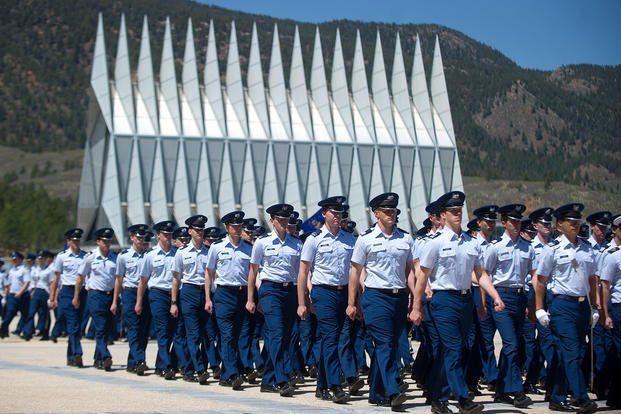
The Air Force Academy is adding more leadership training to help cadets as they take on numerous responsibilities, following a report last year that found older cadets were not sufficiently equipped for their roles causing unhealthy power dynamics.
Last year’s report recommended the school make adjustments to its system for training freshmen to help stop instances of mistreatment and hazing. A rise is sexual assault cases led to a visit by Pentagon officials and the evaluation. In a presentation Brig. Gen. Gavin Marks, commandant of cadets, made to the Board of Visitors on Wednesday, he said a 2022 survey and the last year’s report sparked the changes. The board can ask the academy about morale, discipline, climate, curriculum and other topics.
“We needed to adjust the culture of the cadet wing, specific to how we go about training cadets,” he said
Cadets fill numerous leadership roles, such as teaching younger cadets how to parachute and leading summer basic training. The training was on-going this week in Jacks Valley, an area at the academy where cadets push themselves to their physical limits and learn practical skills, such as firing pistols.
Basic cadets from the United States Air Force Academy class of 2028 go through training at Jacks Valley on Thursday, July 18, 2024. The class started field training July 15 with a 5.2 mile march to Jacks Valley. The training introduces basic cadets to expeditionary skills including first aid, combat arms, field living conditions and more.
“We have always expected our cadets to gain more responsibilities and with those responsibilities come additional privileges. … What we haven’t necessarily done as well as we should is provide the necessary curriculum, the necessary education to back stop our expectations,” Marks said.
As part of the training changes, the academy is no longer going to focus on just the freshmen’s recognition in the spring, an event where they become full members of the cadet wing.
“Everyone training’s will be rigorous, everyone will be held to account for meeting military training objectives,” Marks said. “And we want to celebrate everyone and promote everyone to that next level, assuming they accomplish their objectives.”
The academy is starting classes to help cadets learn to be supervisors as they become sophomores, team leaders as they become juniors and commanders as seniors, he said. They will have classes built into their week and they will be assessed during culminating exercises, he said, during the presentation.
Traditionally cadets face their toughest year as freshmen with a heavy course load and required physical training.
At the start, incoming freshmen, known as basic cadets, face some tough physical challenges during summer training, such as the assault course where cadets are in constant motion, high stepping in place with mock M-16s in hand, while waiting to climb a wall and overcome other obstacles. The cadets spend a day on the course and 10 days total out in the field learning practical skills, such as finding and wrapping bullet wounds.
For example, Cadet Alex Wood was helping to run a training introduced in recent years focused on setting up and learning to defend a forward operating base that’s likely to be attacked. This year, the older cadets are staging attacks on the base at all the entry points, so all 140 cadets participating each day can practice their defensive skills, ahead of possible conflict with China or Russia.
“It’s important we simulate the stress, simulate the procedures now,” Wood explained, saying the exposure will ensure future officers don’t freeze up later.
Next year, older cadets and other leaders may extend a few practices associated with setting up a field base through the whole training. For example cadets may have to patrol the living quarters every night, said Cadet Hannah Plewe, the basic cadet training cadet group commander. Some of the changes to summer basic training have been informed by recent visits to basic training at Lackland Air Force Base in Texas, where enlisted airmen learn to live in deployed environments, she said.
In addition to new leadership training, Marks said, he is adding life skills training because young academy graduates he has spoken to felt more than prepared to be officers, but were not prepared for life off campus.
So, the academy also plans to add education around life skills such as moving, budgeting and investing, according to Marks presentation.
___
(c)2024 The Gazette (Colorado Springs, Colo.)
Visit The Gazette (Colorado Springs, Colo.) at www.gazette.com
Distributed by Tribune Content Agency, LLC.
© Copyright 2024 The Gazette (Colorado Springs, Colo.). All rights reserved. This material may not be published, broadcast, rewritten or redistributed.






